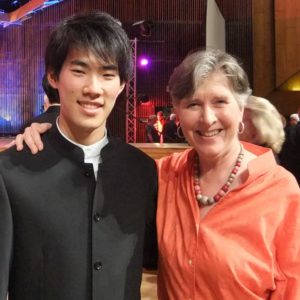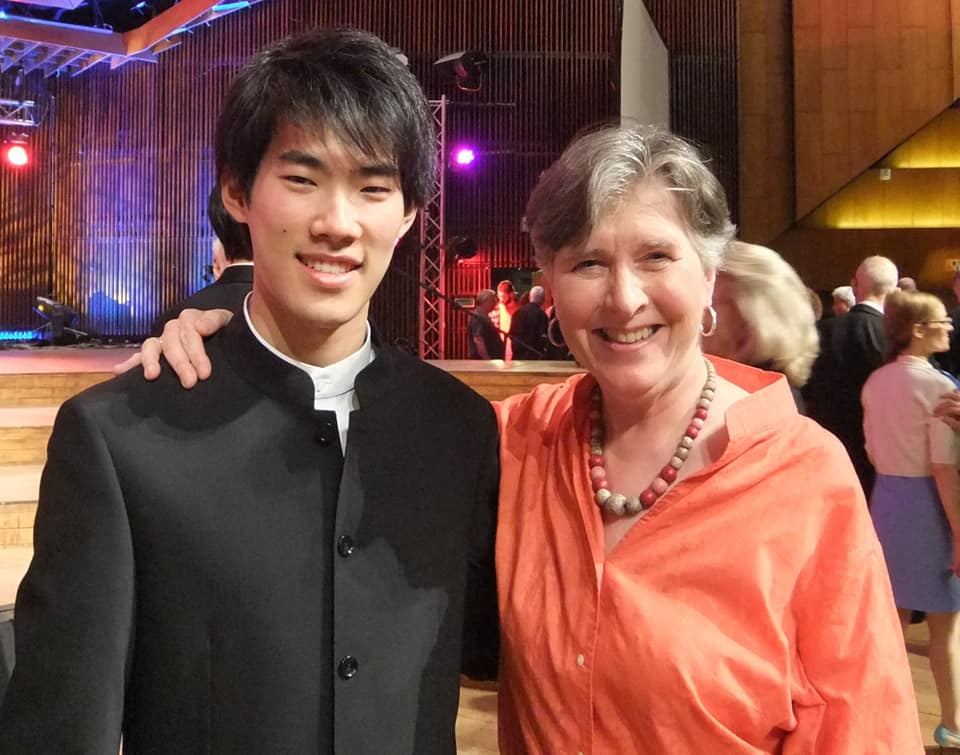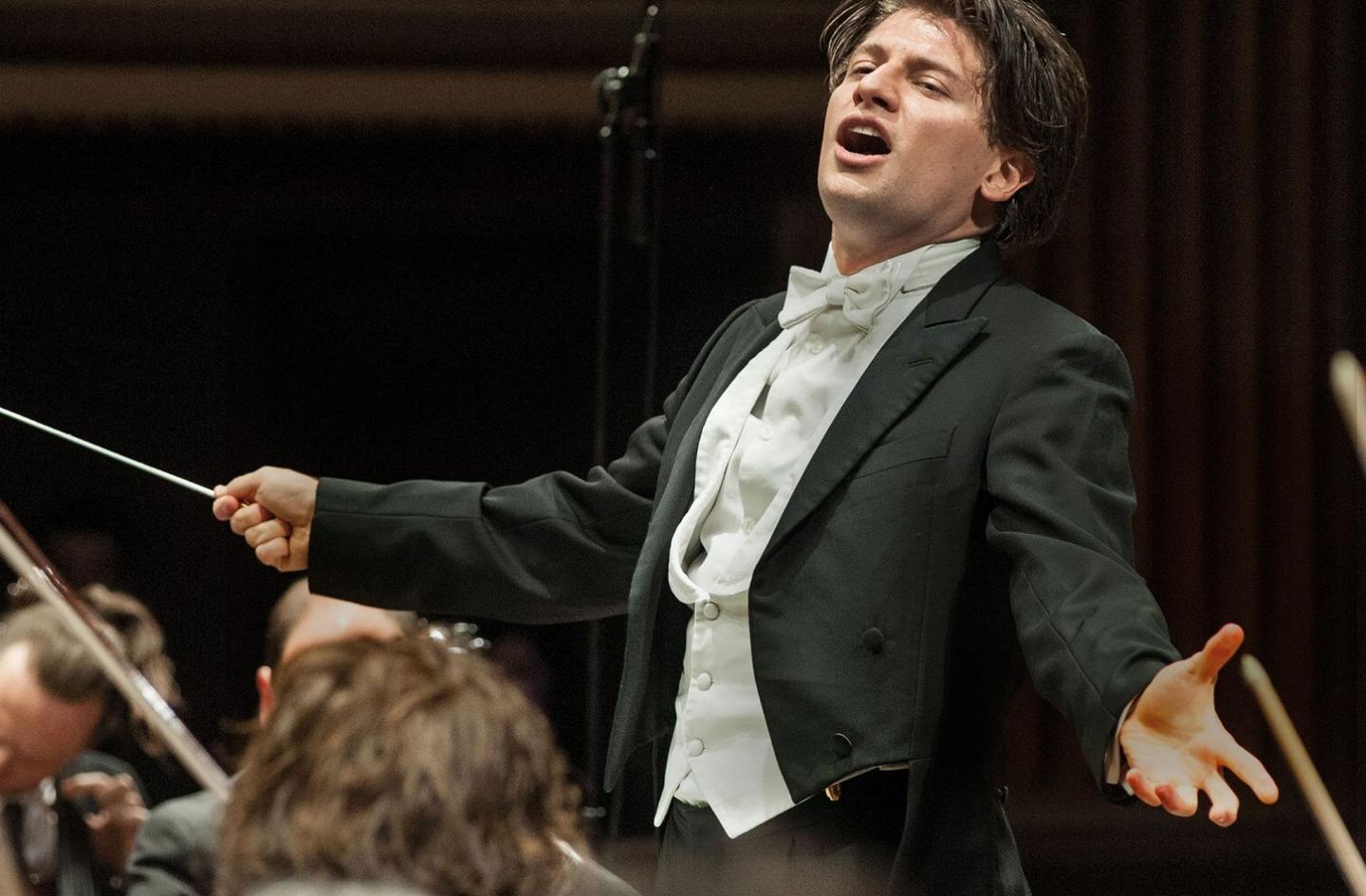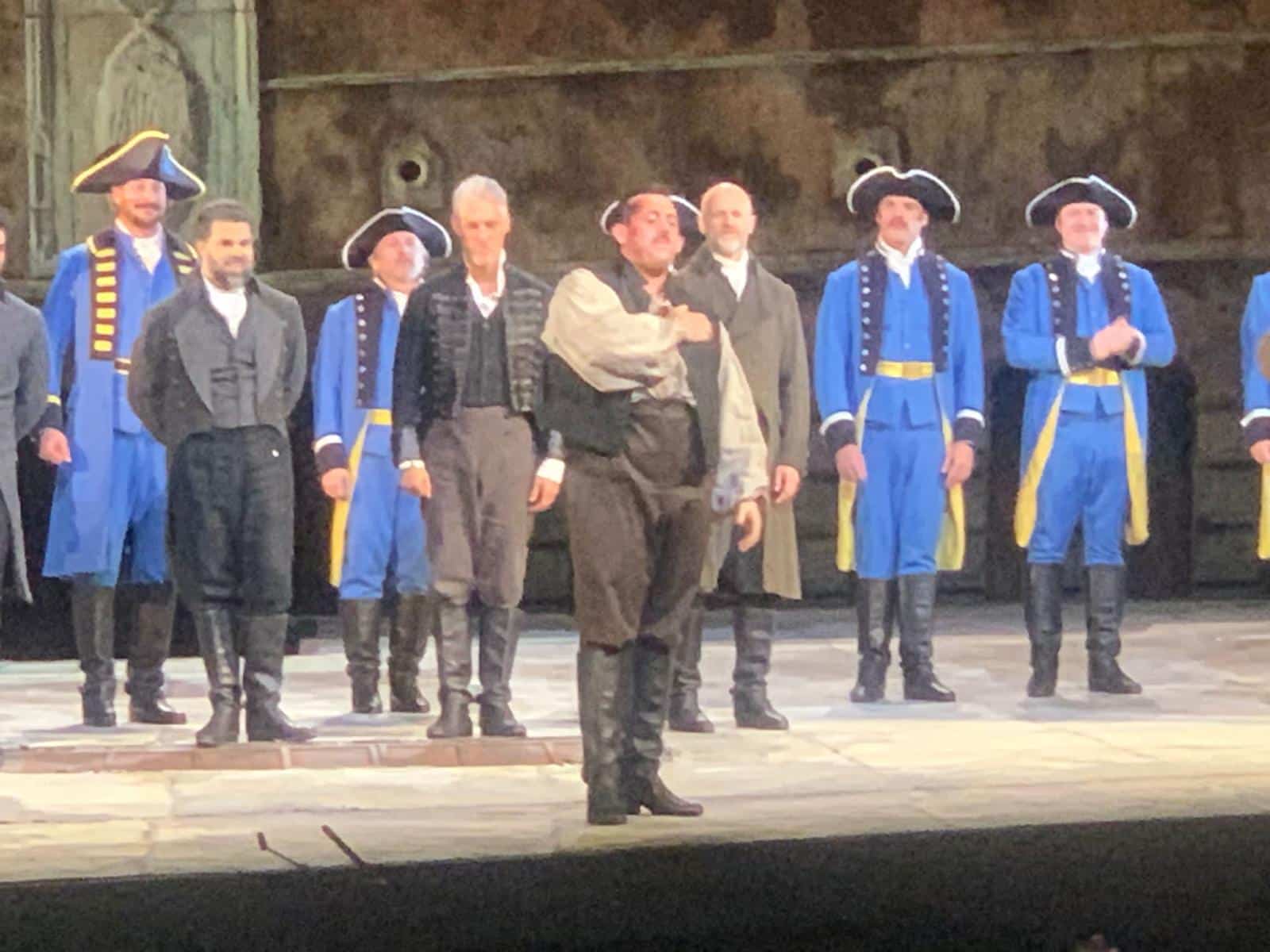I’ve been listening to Canada’s winner since 2013
NewsA post about the Warsaw Competition winner Bruce Liu by the leading Canadian Chopinist Janina Fialkowska:
My heartfelt congratulations to fellow Canadian Xiaoyu Liu, the winner of the 2021 Chopin Competition and a young pianist in whom I always strongly believed since I first heard him in 2013. That year I was invited to judge the finals of a National Canadian competition in Halifax. The standard was high and I was enjoying myself thoroughly when suddenly, out of the blue, this young pianist from Montreal, who was only thirteen, came and played the Liszt Spanish Rhapsody incredibly well on every level. I was impressed. This boy was Xiaoyu Liu and, of course, he won the first prize easily.
He was a charming boy and we were in touch with each other over the next few years. I observed him from a distance as I am always suspicious of these very young mega-talents .The question is always if they can maintain their technical abilities and develop into something genuinely worthwhile.
So it was with great interest that I heard him again when he was by far the youngest competitor in the 2014 Montreal International piano competition. I was very pleased with his progress which was immense, but he was still very young and inexperienced mainly in terms of projection and certain other interpretive aspects. That particular competition really belonged to his elder colleague Charles Richard-Hamelin who seems to be always one competition ahead of Xiaoyu! Charles’ performance in Montreal blew me away and then he, of course, went on to win top prize the next year at the Chopin Competition in Warsaw.
But then we come to 2017 where I next heard Xiaoyu representing Canada at the Rubinstein competition in Israel (photo with the two of us). Here, suddenly, was a huge talent that had blossomed into something very special. For me he was something unique; his playing so subtle, so honest, so elegant and I was not the only juror who loved his playing. Sitting next to me was no less than Chamber Music guru Menahem Pressler who was hugely impressed by Xiaoyu’s performance of the Fauré C minor Piano quartet in the Chamber Music section. I admit, although Xiaoyu was a finalist, I was simply furious that he hadn’t won a top prize so, from then on, I became his champion.
Xiaoyu had always wanted to participate in my “Akademie” in Marktoberdorf, Bavaria, where I invite young pianists who I feel are somehow overlooked or unfairly treated in competitions and who deserve to be heard and perhaps would benefit from encouragement and a little advice from an older colleague. So it was with great joy that I welcomed him to Marktoberdorf in 2019 and we had a chance to really work together and to get to know each other. And there were other opportunities as well. In fact he was due to come back to Marktoberdorf this year in September, but he had to cancel at short notice because of Covid worries.
Xiaoyu proved to me over and over again the following years that my faith in his immense talent and my admiration for him was well placed … and now he has won one of, if not THE most important piano competitions in the world and I am thrilled. And it is important to note, that this young man is also a good and delightful human being which is not always the case with super-talents.







Liu is a perfectly accomplished pianist- technically serviceable- but like dozens of others. Musically down the middle & tonally rather undistinctive in addition to being a pupil of one of the jury. A nice lad of whom should have a reasonable career but hardly the next Pollini, Argerich, Perahia, Zimmerman or even Blechacz (2005 winner). To me- Gadjiev was the most interesting of the finalists- a sensitive musician. Nehring should have won the Gold medal- but for some inexplicable reason- didn’t even reach the final. Most interesting to follow the competition online- illustrating that there are loads of technically brilliant young pianists in the world- but where is the magic of the old masters?
I also think Liu is technically serviceable but musically down the middle. But there were no contestant who were far better than Liu in this edition.
A comment without ears.
Which happens on a daily absis on SD.
Cheers John. I can see you’re a big fan of Liu’s. I’m not denying the boy has talent but let me just book an appointment with an ENT specialist for a new set- so I can truly appreciate your lovely compositions! Tx for the timely reminder.
Great comment, Mark. Normally, the question should be: would I PAY for a ticket to hear this or that?……The answer is: NO! I would neither buy a ticket to hear Mr. Liu nor to hear the music of Mr. Borstlap.
I should add- Liu’s finale of the E Minor Concerto- showed him in his best light. Here was playing of much sensitivity & delicacy which he didn’t fully reveal in the solo rounds
In this case normally the First Prize should NOT BE AWARDED!! And 2021 is exactly this case. There was no winner there.
i’d take sorita over any of the concertos.
the most human interpretation of them all for that e minor warhorse so often blitzed through on squeaky clean semiquaver-laden speed.
Totally agree! That guy has style, poise and talent and he’s off to learn conducting now.
The magic of the old masters, indeed.
If you understand it to be superior skill, broad experience, and comprehensive knowledge of the art, it’s a pretty high bar to expect someone in their 20s to possess the mastery you seek.
Come back in a decade or so; some of them could be well on the way.
Liu is “musically down the middle and tonally rather undistincive” yet Zimmerman [sic] and Blechacz aren’t? What is so tonally distinctive about Pollini? Is Perahia ever not musically down the middle? Your standards are rather arbitrary.
Tx anon. To take 1 examples of non arbitrary standards- the young Pollini’s recording of the Chopin First Concerto- with Kletzki & The Philharmonia (made months after he won the 1960 Chopin) is still the best account. Pure magic- knocking spots of anything Liu is currently capable of (although he may develop) in terms of keyboard colour & delicacy of touch. OK- I agree Pollini’s playing has changed a lot since then but his sound (IMHO) is still utterly distinctive. Also Perahia ‘musically down the middle’- not that I’ve witnessed in numerous live performances.
Fair enough. Pollini is musically interesting, and a pianist’s tonal color cannot be divorced from their musical choices. But I maintain that he doesn’t have that distinctive or hypersensitive touch some pianists possess—you can tell simply by how they play scales, which abound in Chopin’s pieces. Perahia I never find that interesting, but I get that some people enjoy his playing very much. For me personally the new Chopin competition winner has the potential to become a great and distinctive pianist. We’ll wait and see.
I’ve always found Pollini particularly hard-driven and cold. And I’ve seen that in live performances.
Interesting re: Pollini. I just had a conversation with a conductor (one of the nice ones) during a rehearsal break, a propos of nothing, about how Italian pianists tend to have a very immediate quality to their touch – a sort of “ping.” They don’t do that “soft mushy” thing with that German pianists do, for example (think Kempff). He mentioned Pollini specifically as an example of this; it made me think of Michelangeli. It also made me wonder if that’s the quality that Fazioli tries to bring out. Hmm.
The new winner is already a great and distinctive pianist.
If you go to the Deutsche Gramophone website and the Chopin institute, you’ll see how they feel…
The new Chopin Competition is tremendous. He’s the most impressive pianist I’ve heard since Argerich.
And I’ve been studying the piano for over 50 years..
Ha ha!!! Just as Avdeeva!!!
To my mind, really distinctive Chopin playing was exhibited by Argerich, Kissin (at 12 y.o.), Pogorelich, Pletnev (most of the time) Friere and Ablogin (on Pleyel & Erard). Otherwise, most who could do that are DEAD!
Actually, Perahia at least has had a personality of sorts when younger in Leeds. But certainly, neither Pollini nor Blechacz have any! Zimmerman is rarely impressive also.
Of course this happens with every competition: some people, even knowledgeable ones, insist that the wrong person won, that the most deserving player didn’t even make the finals, that the final decision was obviously the result of backstage dealings, and on and on. There was no streaming and no internet comment-land back in the 1960s, so we don’t know how people really felt about Pollini and Argerich at the time. There might have been some unsung genius who might have outshown either one of them (according to somebody anyway), but didn’t make it out of the semis.
I find it interesting — and I still recommend it — to look up the list of past winners of the Chopin, Tchaikovsky and Cliburn competitions, to see how many gold medalists are forgotten now, while 4th-prize winners are household names. It does happen once in awhile. (For example: I recall that Garrick Ohlsson won the gold in 1969, and 2nd place went to Mitsuko Uchida. They’ve both had substantial careers, of course, but there’s no question who’s been the “bigger name” for a couple of decades now.)
Good point Bruce about some of the winners falling into relative obscurity- whilst those lower down the prize pot hitting the headlines. Further examples- (again the Chopin Competition sorry)Haraseiwicz won the 1955 contest (probably deservedly) but we all remember Ashkenazy who finished runner up. Wasn’t Andras Schiff placed only third at Leeds? Of course- there also quite a few great ones who never got past the first round. Did Cziffra, Horowitz, Richter or Earl Wild ever win a competition? They were above them. But for a young pianist today they are a sine qua non & the chances of a career without them are virtually non existent.
1970.
The President of the Chopin Institute disagree with you( see article from my link). And so does its principal conductor and the Polish press!
As a pianist, I put Bruce’s technique next to Argerich and his artistry comparable to a young Zimerman..
https://www.archyworldys.com/chopin-competition-we-have-met-the-laureate-bruce-liu-the-winner/
Your comment is ridiculous!
Even you didn’t even listen to Liu play or you’re just jealous!
Are you aware that this decision may be an unanimous decision?
Also, the President of the Chopin Institute said it was the DEEPEST competition in its history.
And the winner is impressive both as a phenomenal technician and an artist…
You should listen to how great this pianist is before you bash him. He is beyond praise! This is stage 1
https://m.youtube.com/watch?v=jjhxpTQvLqY&t=24s
@ Mark Mortimer:
Nehring didn’t make the finals because he wasn’t as worthy as 12 other pianists.
Among those 12 finalists, 17 judges deemed Bruce Liu as the most worthy.
According to the President of the Chopin Competition, Artur Szklener, it wasn’t even a doubt who would be the winner.
Even the conductor Krzysztof Stefanski said Mr. Liu was a phenomenal pianist perfectly suited for Chopin.
If you doubt this, go to the Chopin Institute website and read what they said.
I cannot agree more with you, Mark, although Gadjiev also played way under his real ability!! There WAS NO MAGIC of old masters or even living masters like Argerich, Freire, Pletnev, to name just a few….
I don’t know how many of these comments are coming from piano teachers or accomplished pianists, or, even would-be pianists, but I do recall Anne Koscielny, (my sister’s) comment that Piano playing is so hard, that it deserves our respect. She felt one should listen and withhold judgements which are destructive and petty. She was a teacher and could be critical with her students, but her advice was positive, not abusive. These comments are abusive, and, in my opinion, highly inaccurate. I spent several hours listening to the winner of the Chopin Competition, and it was true to the spirit of Chopin’s music, cleanly executed, and full of musical understanding. He fully deserves recognition as an outstanding young artist. Underline, “ARTIST.”
Mrs Koscienly- nobody is being abusive about Mr Liu’s performances here- not even me- so this is a rash overstatement of the facts. The majority appear very positive. In fact- we all acknowledge his abilities whilst those of several other contestants. You are quite right to say- anybody playing the piano well is deserving our respect. It is indeed ‘hard’. I speak as a piano teacher & professional pianist.
It’s pretty clear that the “old guard” is freaking out that a new star is born.
What sets Bruce Liu apart from other up and coming stars is Bruce is not only an amazing musician and artist, he’s also an virtuoso to rival the young Horowitz!
Dear Janina, how nice to read your remarks!Monika
Oh, dear!!! Liu & Fialkowska — both the “greatest Chopinists” the world has ever known!! (Maybe in Canada?!?) Glenn Gould come to mind with this incredible and unforgettable Third Sonata, but the above mentioned two.
Bruce (Xiaoyu) Liu? He’s a citizen of the world, like our Frederick. Liu has all the predispositions for greatest post-competition career since Martita (1965). It’s often said he’s a very modern, 21st century artist, a Chopin player of the future. But for me, he is also a musician looking back to the past. Bruce managed to seduce and delight many admirers of the first half of the 20th century’s pianism. And this year’s Chopin competition? It’s been at the highest level for many years.
Liu delighted me already in the first stage: his Nocturne in C sharp minor, Op. 27 was a great experience. Liu builds up the tension slowly by dragging the phrase, grading the dynamics (crescendo) over a fairly long stretch. A quasi-mazurka climax, a reminiscence of former happiness, does not bring a dramatic solution; for the pianist it is the middle recitative that becomes the apogee of the drama. Here Liu brings out from the bass register of Fazioli the colours that few pianists let us experience – this is a moment that every listener sitting in the audience of the Warsaw Philharmonic Hall will remember forever.
Etudes? Also brilliant. Despite illuminating the details and dynamic fluctuations within the figuration, the pianist doesn’t stop the momentum of the narrative even for a moment, indeed, his expression kindles the fire. Bruce brilliantly shows the inner texture of the miniatures. Liu’s great strength is his own imagination.
The most extraordinary things, however, took place in the “brilliant” pieces that Liu took to the Olympic level. Rondo a’la Mazur, Op. 5 of the second stage, with its sterile precise singing trills and campanella-shaped fioritures, can probably only match the famous recording of Sviatoslav Richter (1968). Shura Cherkassky finally found his successor decades after the legendary recordings of the Variations on the theme “La ci darem…” from Mozart’s Don Giovanni. The vocal provenance of phrases, dialogues like on an opera stage – it made us hold our breath for… 20 minutes. Grande Polonaise, Op. 22? Countless fioritures are given a rhetorical meaning, and at the same time – the bright, Hoffman-like virtuosity!
So, two foundations of Liu’s pianistic genius? IMO – his phrasing and his touchée.
The way the phrase is formed – its fluctuation, agogic shifts, microrubatos – undoubtedly derives from the pianists of the 20th century – especially Ignacy Friedman and Alfred Cortot, who treated the phrase as a sentence or singing. Liu imitates their declamation; each motive or melodic line has a rhetorical meaning. Maybe the best example is his version of Concerto in E minor – let us listen to the treatment of lyrical themes in E minor and E major in Allegro maestoso, in Larghetto’s cantilena. In Romance, we have no doubts that it is a conversation between two lovers, and the cascades of double sounds express love in its purest form. On the other side, Bruce takes care of highest quality sound – from the noble bass to the most delicate piano-pianissimo of the instrument’s upper registers. Here, the source of inspiration is undoubtedly Arturo Benedetti Michelangeli, maybe also Krystian Zimerman. When it comes to the beauty of the sound, Liu already has very few peers in the world.
Those who say “accomplished pianist – technically serviceable – but like dozens of other” – probably not many fine musicians have heard in their lives.